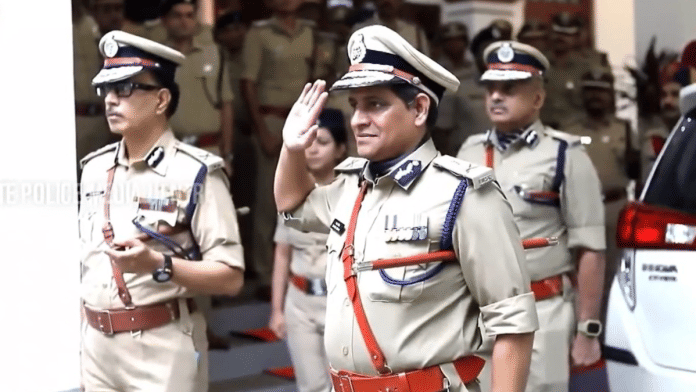Thiruvananthapuram: The appointment of Ravada A. Chandrasekhar as Kerala’s new Director General of Police (DGP) has sparked a political controversy in the state, with the opposition Congress raking up the 1994 Koothuparamba police firing case in which five Democratic Youth Federation of India (DYFI) activists were killed.
Chandrasekhar, a 1991-batch IPS officer of the Kerala cadre and a native of Andhra Pradesh, was appointed Kerala’s police chief Monday, succeeding Shaik Darvesh Saheb, who retired the same day. Chandrasekhar was on central deputation as special director in the Intelligence Bureau and took charge as DGP in Thiruvananthapuram Tuesday.
As Chandrasekhar assumed office, opposition Congress alleged his appointment was a “political compromise” between the ruling CPI(M) in the state and the BJP-led Centre.
All India Congress Committee (AICC) general secretary and Alappuzha MP K.C. Venugopal alleged that Chandrasekhar was only recently posted in the Prime Minister’s security team.
Venugopal claimed that another officer, Nitin Agarwal, was also shortlisted by the Union Public Service Commission (UPSC) but was overlooked due to disagreements with the central government. “The serious matter here is that the new DGP is a political compromise between the central government and the CPI(M). There’s no doubt about it,” he said.
Chandrasekhar was posted as assistant superintendent of police (ASP) in Thalassery, Kannur, just two days before the Koothuparamba incident in November 1994. On the day of the incident, activists of DYFI, CPI(M) youth wing, were protesting against the then UDF government’s education policy, which allowed government quota seats to be given to management.
They blocked the car of then minister M.V. Raghavan who had arrived to inaugurate a cooperative bank’s evening branch in Koothuparamba. Police opened fire on the protestors, killing five DYFI members and injuring several others, including a youth named Pushpan, who remained bedridden until his death in 2024.
The incident remains etched in public memory and is often referenced by CPI(M) leaders and on campuses across Kerala as a symbol of police brutality against party activists. Pushpan, often referred to as a “living martyr”, continues to be commemorated in party songs.
A judicial inquiry in 1997 found the police action unwarranted. Subsequently, Chandrasekhar, then deputy SP Abdul Hakkim Bathery, then sub-divisional magistrate T.T. Antony, and others were charged with murder and criminal conspiracy by a Kannur court.
In 2012, the Kerala High Court quashed the charges against all the accused, citing the absence of government sanction for prosecution.
Venugopal said he has no personal issue against Chandrasekhar, but the CPI(M) should clarify whether its earlier stand against the officer was wrong. “I have no personal disrespect for the officer. He might have acted as part of his responsibility, but the allegations made by the CPM back then are all in the public domain. The CPM convinced their cadres, the martyred cadres, and the families of the martyrs about many things. If you look closely, there’s a great mystery as to why they’re changing their stance now.”
However, CPI(M) state secretary M.V. Govindan defended Chandrasekhar, saying the officer was new to the district at the time of the incident.
“He was appointed there just two days before the incident. He’s from Andhra Pradesh and didn’t even know the geography or politics of Thalassery or Kannur. We all know the firing and lathi-charge were led by T.T. Antony and Abdul Hakkim Bathery. The court itself acquitted all of them. He is not guilty until the court says so,” he said.
(Edited by Ajeet Tiwari)
Also Read: Booted & back in 2022, Kerala ADGP puts Pinarayi in tight spot again amid LDF-backed MLA’s charges






